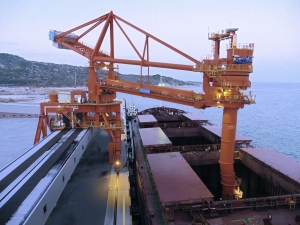


(Posted on 07/07/19)
thyssenkrupp aims to be climate neutral from 2050 onwards. As early as 2030 the Group plans
to cut emissions from production and outsourced energy by around 30 percent. Emissions
from the use of thyssenkrupp products are to fall by 16 percent by 2030. thyssenkrupp’s new
climate strategy is based on the Paris Climate Agreement of 2015.
thyssenkrupp CEO Guido Kerkhoff: “The threats posed by climate change affect us all. As an
industrial company with operations around the globe we are in a particularly good position to
reduce greenhouse gas emissions through sustainable products and processes. We take this
responsibility very seriously and have received several awards for this in recent years. Now we
are setting ourselves clear targets for 2030 and 2050 as the next logical step.”
In February thyssenkrupp was named as a global leader in climate protection for the third year
in a row by the non-governmental organization CDP, which assesses whether companies have
formulated a coherent strategy on how to further improve their own environmental performance
as well as that of customers and suppliers. thyssenkrupp once again achieved the highest
score possible and was placed on CDP’s global “A List”. The list includes roughly 130
businesses worldwide and only five DAX companies.
The targets now announced take in thyssenkrupp’s own production operations, the energy it
purchases and its products. In steel production, for example, thyssenkrupp is currently
pursuing two approaches to reducing CO2 emissions: The Carbon2Chem project, which is
expected to be available on an industrial scale before 2030, and the so-called hydrogen route,
which should take full effect by 2050 and make the biggest contribution to directly avoiding
CO2. Carbon2Chem converts steel mill emission gases, including the CO2 they contain, into
valuable chemicals. thyssenkrupp’s hydrogen route involves replacing coal with “green”
hydrogen as the reducing agent for blast furnaces so that in the long term no CO2 is created in
the production of steel. These technologies are being funded by the German federal
government and the state of North Rhine-Westphalia.
Under its Climate Action Program for Sustainable Solutions (CAPS) thyssenkrupp will also
systematically work to make its products carbon neutral. The Group already offers a technology
for the cement industry that permits CO2 emissions from the combustion processes to be
captured for subsequent storage or processing. In the area of sustainable mobility
thyssenkrupp is working with European partners to produce fuel from biomass. These fuels
reduce CO2 emissions by up to 90 percent compared with conventional fuels.
Other key areas include the e-mobility sector, where thyssenkrupp supplies battery production
lines and special steels for electric motors. The Group is also actively involved in the
development of energy storage solutions, for example with electrolysis systems that convert
electricity into hydrogen. These storage systems allow a constant supply of electricity from
renewables regardless of the weather.
Dr. Donatus Kaufmann, thyssenkrupp Board member responsible for technology, innovation,
sustainability, legal and compliance: “Our goals are ambitious but achievable. Our strategy for
our steel operations alone will cut production-related emissions there by 80 percent by 2050.
But if we are to achieve our climate targets we need to make significantly more use of
renewable energies. Also, there are no internationally harmonized financial incentives for
investments in CO2 abatement technologies. These are basic requirements for making a real
change.”
Leading vessel performance platform Smart Ship Hub says the industry should expect a breakthrough year... Read more
The Nordic countries are taking an important step towards decarbonising maritime transport with the... Read more
Germany’s Steelpaint has appointed ADD Marine as its representative for Greece and Cyprus, strengthening... Read more
Rio Tinto’s first Pilbara-made iron ore rail car has rolled off the production line in Karratha... Read more
Precision meets progress at Phu My Port, Vietnam. The LPS 550 has been deployed to handle bulk commodities... Read more
bound4blue, a global leader in wind propulsion systems, has expanded its industrial footprint in Asia... Read more
As the industry explores multiple decarbonisation pathways, methanol is gaining attention as a practical... Read more
Technology group Wärtsilä will supply an integrated hybrid propulsion system for a bulk carrier... Read more
Superior Industries, Inc., a US-based manufacturer and global supplier of bulk material processing and... Read more
ESL Shipping has taken a significant step forward in digitalisation by deploying a new multichannel... Read more